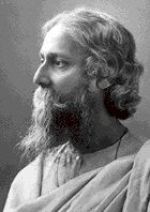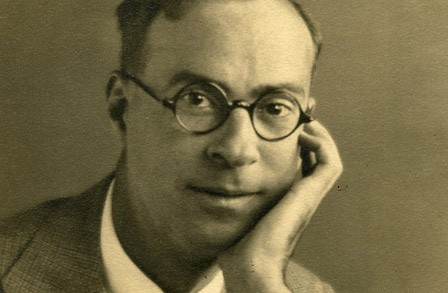I touch God in my song
I touch God in my song
as the hill touches the far-away sea
with its waterfall.
The butterfly counts not months but moments,
and has time enough.
Let my love, like sunlight, surround you
and yet give you illumined freedom.
Love remains a secret even when spoken,
for only a lover truly knows that he is loved.
Emancipation from the bondage of the soil
is no freedom for thee.
In love I pay my endless debt to thee
for what thou art.
- Rabindranath Tagore

/ Photo by smerfeo /
Tagore and Karma Yoga: Focusing on Moments
…only a lover truly knows that he is loved.
In this poem’s few short lines, Rabindranath Tagore marries the bhakti path of utter love for God with the heart of karma yoga’s union through service and action.
In traditional Indian metaphysics, the goal is usually understood to be enlightenment and freedom from the karmic tug that traps us in the cycle of earthly embodiment, “emancipation from the bondage of the soil.” But here Tagore challenges the otherworldliness that often engenders.
Even the spiritual idea of liberation can become a selfish goal. For one utterly in love with God, the paying of that “debt” is simply a labor of love. Every effort, every experience, even suffering, is simply an expression of one’s love for God. That is enough right there for the true lover of God. Rather than seeking escape from “the soil,” the world is seen as a panorama that offers endless opportunities to worship and experience the Divine.
This is the great vision of karma yoga.
It is also the attitude that finally allows us to be at rest on our spiritual journey, rather than live as a convict on the run. What some see as the prison yard, becomes instead an exercise yard… or a playground! It is a courageous way of acknowledging that freedom is not escape, it is deep presence.
And we find that we live not in fleeting time, but in the ever expanding present moment.
The butterfly counts not months but moments,
and has time enough.
Rabindranath Tagore (sometimes rendered in a more modern transliteration as Thakur or Thakura) was one of the great writers of the early 20th century.
Rabindranath Tagore was born to a wealthy Brahmin family in Calcutta (Kolkata) in West Bengal during the British occupation of India.
His mother died when “Rabi” was a young child and his father’s responsibilities often required travel, leaving Rabindranath to be raised by elder siblings and family servants. His family was central to regional political, intellectual, and artistic social circles, however, ensuring that the young Tagore was exposed to great art and learning from an early age.
Tagore began composing poetry by the age of six and showed such a natural gift that he, at the age of sixteen, published a set of poems under a pseudonym that was mistakenly received by critics as a long-lost masterpiece. Only later was it revealed that the author was the adolescent Tagore.
As an older teenager, Tagore was sent to study in England, but soon left school to more actively feed his wide-ranging interests through self-study.
At the beginning of the 20th century, Tagore established an ashram as a place for learning, teaching, and agricultural experimentation.
Tagore was a strong advocate for Indian nationalism in opposition to British imperial rule, while criticizing the most violent expressions of revolution.
During his lifetime, Tagore traveled extensively, meeting the world’s great writers, scientists, political leaders, and social reformers.
Rabindranath Tagore was also an accomplished painter, as well as a musician and prolific composer, with more than 2,000 songs to his credit.
Tagore’s poetry draws from the rich devotional poetic traditions of India, but rendered in a highly fluid, contemporary style. His impact on world poetry and literature is immense, especially writing that explores the modern mind through the mystic’s lens. Countless literary figures of the 20th century cite Tagore as an important influence and source of inspiration. Although his library of poetry is extensive, his most widely read and loved collection is The Gitanjali.
In 1913, he became the first non-European to with the Nobel Prize in Literature.
Rabindranath Tagore was born to a wealthy Brahmin family in Calcutta (Kolkata) in West Bengal during the British occupation of India.
His mother died when “Rabi” was a young child and his father’s responsibilities often required travel, leaving Rabindranath to be raised by elder siblings and family servants. His family was central to regional political, intellectual, and artistic social circles, however, ensuring that the young Tagore was exposed to great art and learning from an early age.
Tagore began composing poetry by the age of six and showed such a natural gift that he, at the age of sixteen, published a set of poems under a pseudonym that was mistakenly received by critics as a long-lost masterpiece. Only later was it revealed that the author was the adolescent Tagore.
As an older teenager, Tagore was sent to study in England, but soon left school to more actively feed his wide-ranging interests through self-study.
At the beginning of the 20th century, Tagore established an ashram as a place for learning, teaching, and agricultural experimentation.
Tagore was a strong advocate for Indian nationalism in opposition to British imperial rule, while criticizing the most violent expressions of revolution.
During his lifetime, Tagore traveled extensively, meeting the world’s great writers, scientists, political leaders, and social reformers.
Rabindranath Tagore was also an accomplished painter, as well as a musician and prolific composer, with more than 2,000 songs to his credit.
Tagore’s poetry draws from the rich devotional poetic traditions of India, but rendered in a highly fluid, contemporary style. His impact on world poetry and literature is immense, especially writing that explores the modern mind through the mystic’s lens. Countless literary figures of the 20th century cite Tagore as an important influence and source of inspiration. Although his library of poetry is extensive, his most widely read and loved collection is The Gitanjali.
In 1913, he became the first non-European to with the Nobel Prize in Literature.
More on this poem and Rabindranath Tagore from Poetry Chaikhana






 Singing oneness!
Singing oneness!